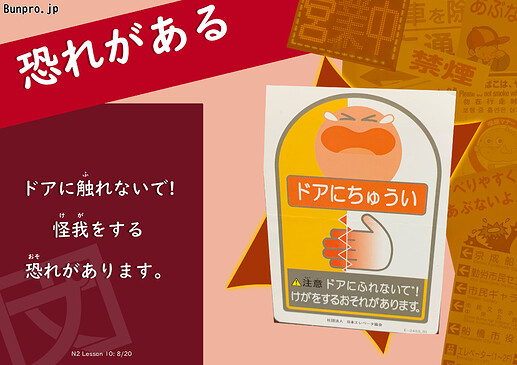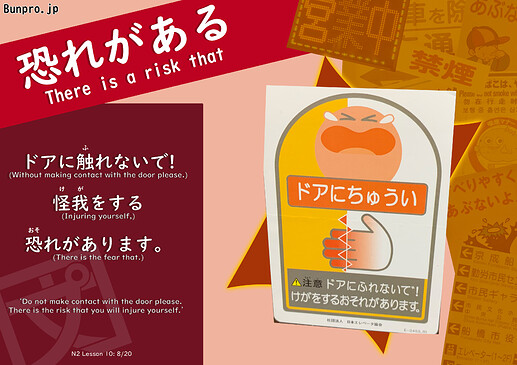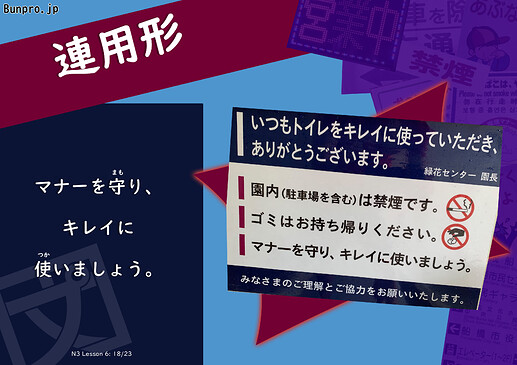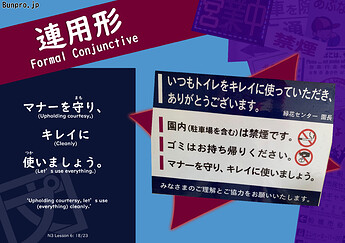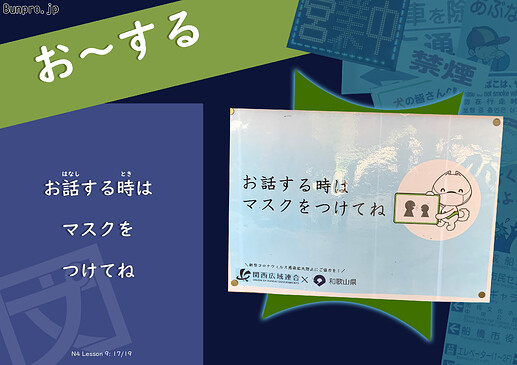July 31st
Summary
Don’t put your hand in the door! There is a risk of getting hurt.
吹雪が続くので、危ない運転具合になる恐れがあります。
Summary
Literal: Don’t be touched by the door! There is a risk of injuring [yourself].
Natural: Don’t touch the door! You’ll hurt yourself!
(since it’s in hiragana for kids)
Why is it ドアに instead of ドアを?
From English, you’d think “I touch the door”, but this seems to be closer to “the door touches me”.
...
Please, don’t stick your hands in the door! There is a risk of injury.
Bonus points I missed from yesterday
After writing this I will go back to work.
お疲れ様です!Or maybe ご苦労様でした? Can’t say I really know the difference here.
After tidying things up I’ll play to my heart’s content.
Sounds like a good plan to me!
Translation 😭
Please don’t touch the door! There’s a chance of getting hurt.
Is the context of this sign like an automatic door, elevator door, or something along those lines? It looks like it’s depicting the fingers getting crushed.
Attempted use 🧟♂️
噛まれた後で、ゾンビになる恐れがある...
恐れがある Replies + Bonus so far
Since there’s a blizzard ongoing, there is a possibility of driving conditions becoming dangerous.
Note to self, check Arizona for jobs. I’m soo done with precipitation.
I have two thoughts here (although I am super noob, fyi). Leafing through my copy of Japanese the Manga Way there are two separate sections of に that mention some different uses
Ni marks a surface [Page 94]
Ni can mark the surface on/against which an action takes place, such as a writing or drawing on a sheet of paper (kami ni kaku), or reflecting in a mirror (kagami ni utsuru), or setting something on a shelf (tana ni oku)… ni can be thought of as marking the endpoint of an action in these cases.
Sample 170: 今日、坊主がびょうぶにじょうずにボウズの絵を書きました。(Today a priest skillfully drew a picture of a priest on a folding screen.)
に may mark the direct object [Page 72]
With some verbs, ni is used instead of o to mark what English speakers may think of as the direct object of the verb. In many cases, this ni will mark the end point/destination/target of a movement or action…
Sample 128: 取引先に電話するぞ。(I’m going to call the client.)
I’m not sure if either of these is what’s happening here, but I thought I’d share.
“Ah, now we have to explain this and why ccookf is wrong too!  ”
”
~Admins, probably…
Summary
Don’t touch the door! There is a risk (a scare) that you might get hurt!
Summary
This one makes sense. And I didn’t know this usage existed! Thanks!
It’s interesting how these translation exercises sometimes make you see some other nuance that you didn’t realize before. 
Translation
Please don’t touch the door. You might get hurt.
Use case
台風の恐れがあったらなるべく出かけないでください。
First i tried 台風恐れ that should be correct according to bunpro but bunpocheck tagged this as wrong. Does any know why?
Translation
Don’t touch the door! There’s a risk you’ll get hurt.
July 31st Translation
Notes: ドアに…?えっ?…に? It looks like you guys noticed that に seems to be used in a little bit of an unusual way here. This comes from the difference between 触る(さわる)、and 触れる(ふれる)。さわる tends to focus more on ‘touching’, in the general sense we think of it in English, while ふれる is more like ‘come into contact’. に触れる/触れない is an example of omission, in which the を is actually placed on the part of the body that is being made contact with. 手をドアに触れないで! When the body part is omitted, it is usually because it is obvious (picture of the hand on this sign), or because it means ‘anything’, ‘don’t contact the door with -any part of- your body’.
With the picture of elevator type doors and the hand, I assumed the context (unless there are other body parts we are worried about here).
Summary
Mind your manners, let’s keep/use clean and pure (behavior/speech).
もう少し思い、明日教えてね
Summary
Mind your manners and don’t be messy!
Bonus point from 7/31 I missed
台風の恐れがあったらなるべく出かけないでください。
If there is a chance of a typhoon please leave if possible.
Summary
マナーを守り、キレイに使いましょう
Observe the mana flow use it to clean!
Be a decent human being and help make it clean.
The associated Tae Kim reading kind of went off in a couple other directions with the verb stem, but am I right in understanding this as a way of using certain stems as a conjunction?
Use Case
私わ「ソマ」といったゲームしたニノマエイナニスさんを見終わって泣き、下着を着換えした。
I hope that was decent, I kind of pushed myself to use a lot of stuff and it was really weird trying to figure out how to say “I changed my underwear.”
Edit: Switched the name to katakana (ニノマエイナニス←にのまえいなにす), postfixed さん for clarity? Would there be an appropriate way to refer to entertainers here?
s1212z
もう少し思い、明日教えてね
I’ll think about it a little and teach it tomorrow(?)
Summary
‘Think about it a bit more, let me know tomorrow’
Looks like 私は is the beginning , not sure what にのまえいなにす is though.
Awesome! Two toilet signs in one week! Truly practical Japanese! 


Summary
Literal: Protect good manners and let’s cleanly use [the restroom].
Natural: Please practice good manners and keep the restroom clean.
Bonus: the rest of the sign
Just because I realized that I (miraculously) understood the rest of the sign…
We humbly thank you for always cleanly using the restroom.
Smoking is prohibited within the park (including the parking lot).
Please take your trash with you [when you leave].
Please practice good manners and keep the restroom clean.
We humbly ask for everyone’s understanding and cooperation.

translation
Please behave, and keep the place clean
use case
天気予報によると天気が晴れになりそうだから今朝文法を勉強し今日の午後ガーデニングをします。
Edit:
Guys' use case translation
もう少し思い、明日教えてね
Think about it a bit more and tell me tomorrow.
私わ「ソマ」といったゲームしたニノマエイナニスさんを見終わって泣き、下着を着換えした。
I finished watching Ninomae Inanis playing the game called ‘Soma’, cried and changed my underwear (  why ?)
why ?)
...
Behave yourselves, and keep it clean [looking good] after use.
August 1st Translation
Notes:
In a sentence sign like this, it is really up to the interpretation of the reader exactly what should be キレイに使いましょう (used cleanly). As all of the points in the sign refer to the park, the most natural assumption would be ‘the park, and all of it’s facilities’. Or simply ‘everything’. It may also be worth noting that マナー in Japanese, doesn’t quite have the same nuance as in English. マナー refers to being aware of your surroundings, and acting accordingly. This is much closer to ‘etiquette’.

